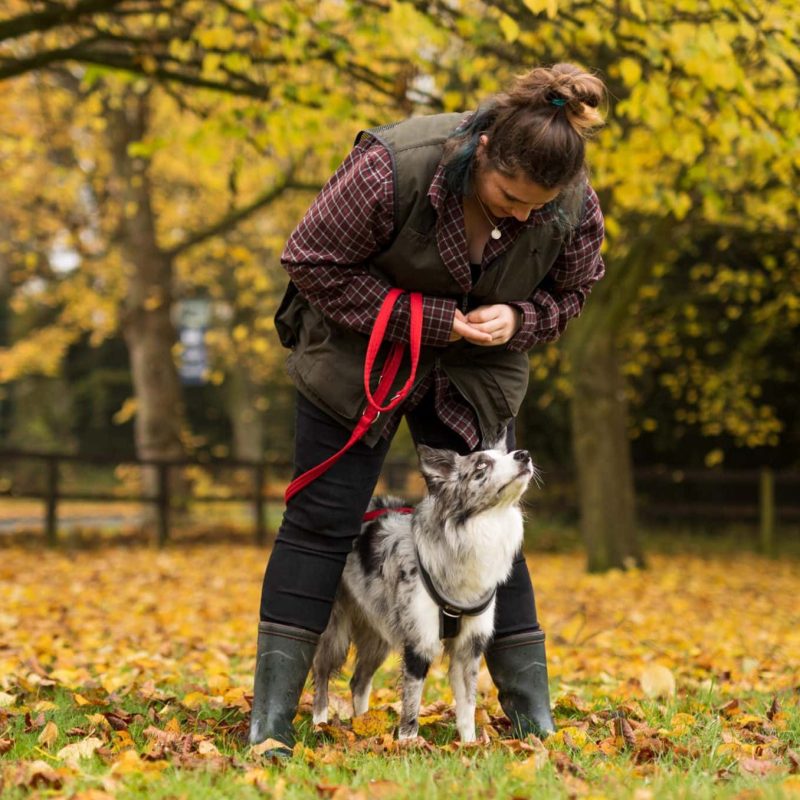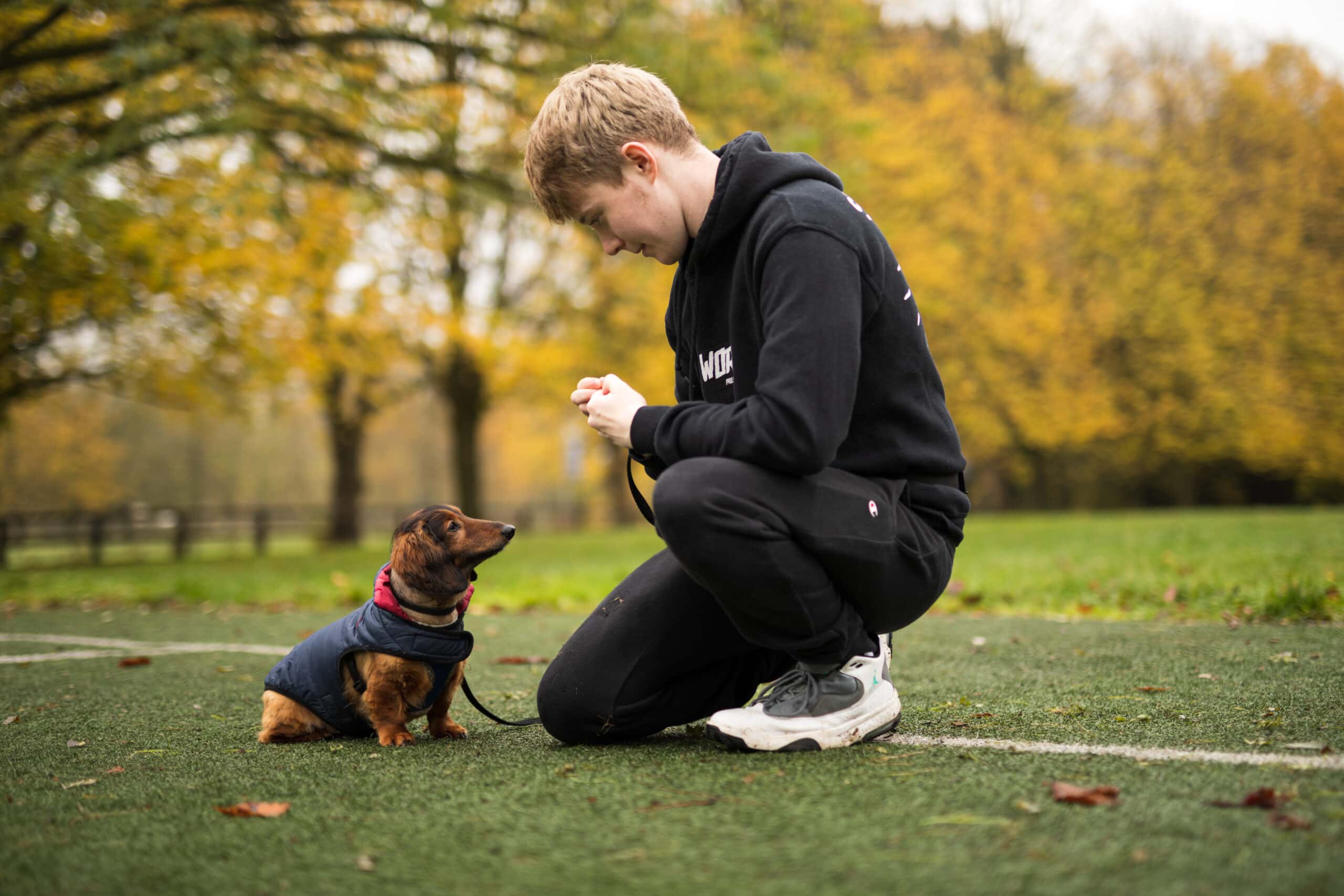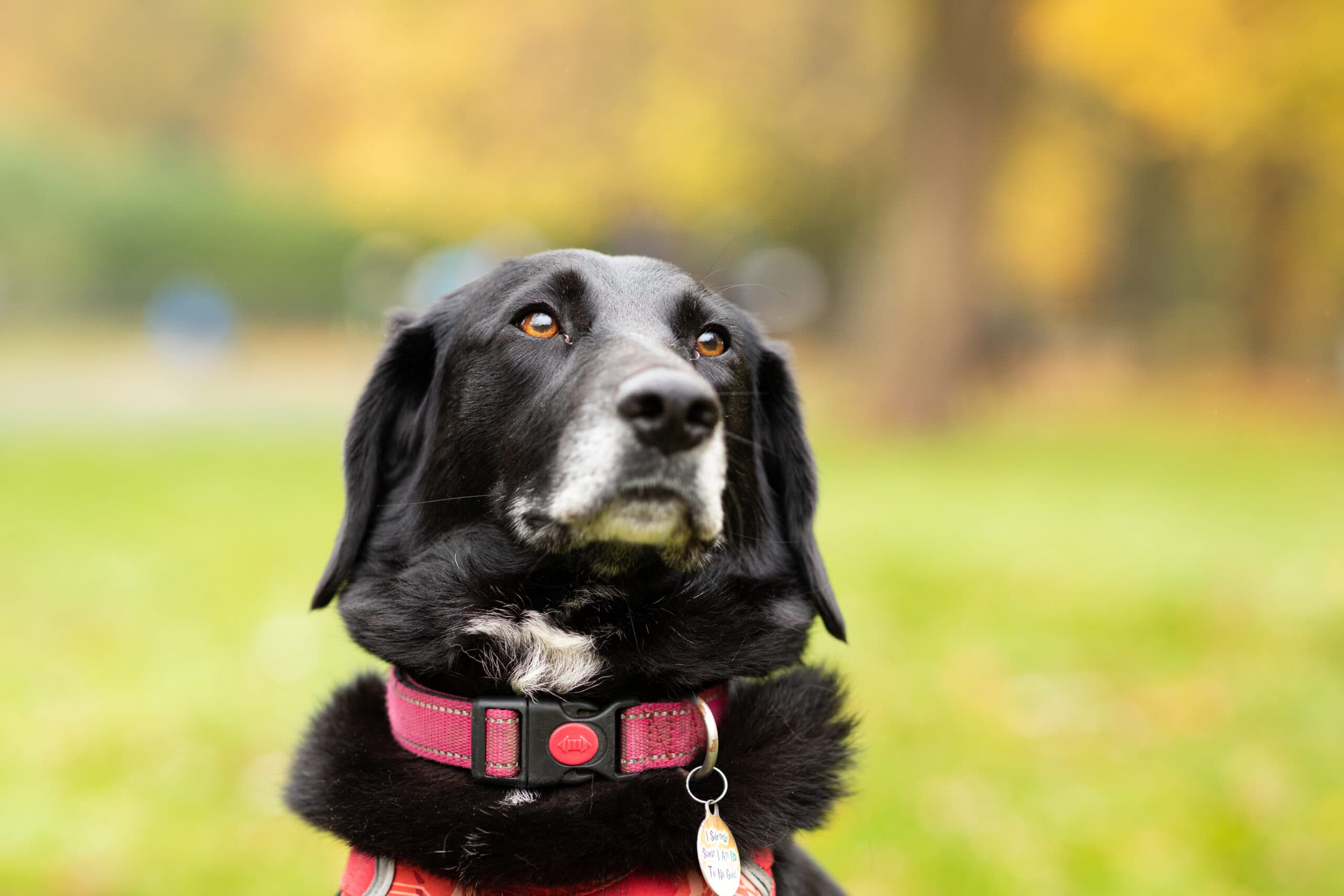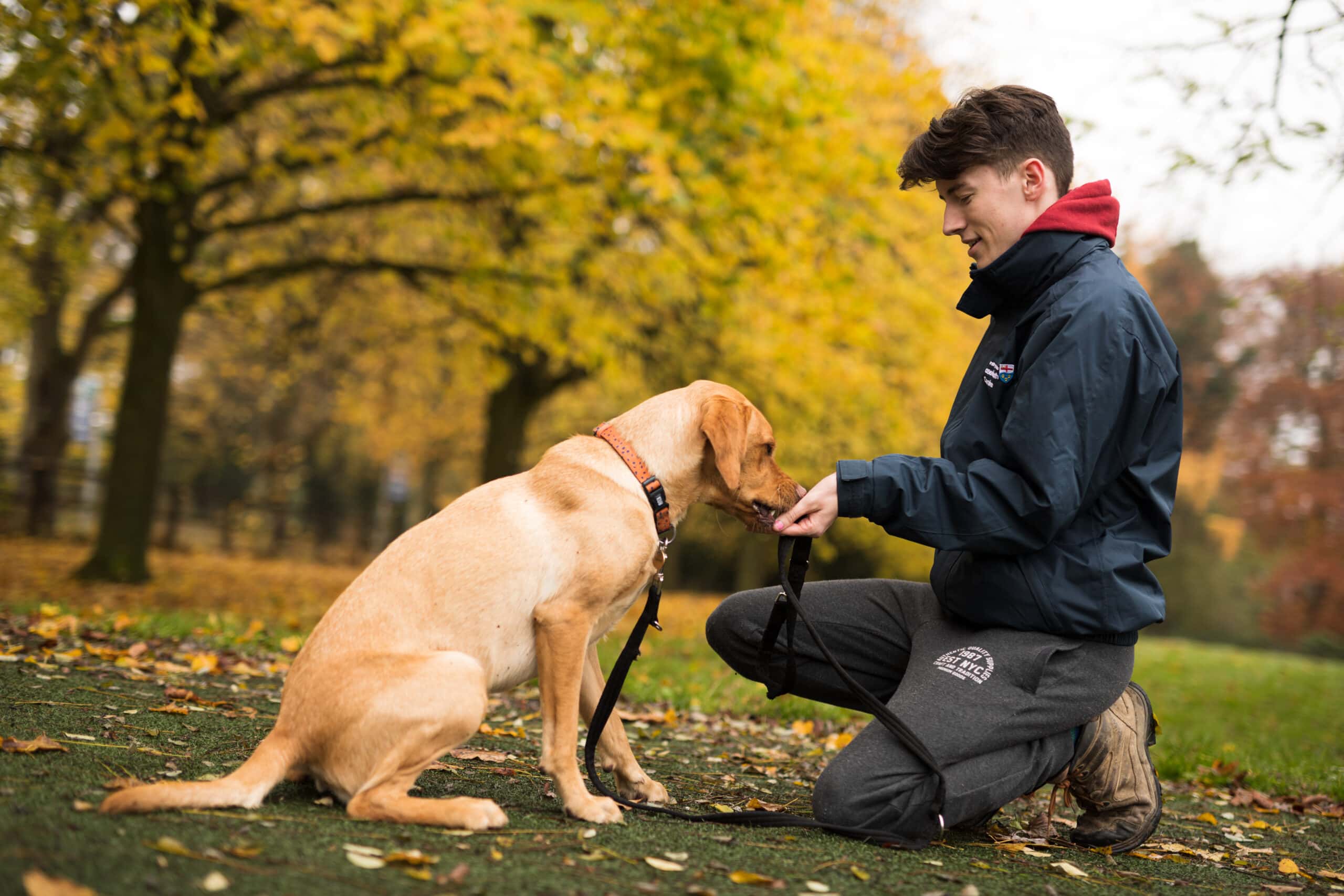With 33% of households having a dog* there has never been a better time to pursue a role within the canine industry!
If you have the passion and commitment to work not only with dogs, but also with their owners, this is the degree for you! This course will allow you to develop a broad range of practical and theoretical skills.


Emphasis is placed on understanding canine behaviour and the principles of training in the first year, before applying these to understanding how canine behaviour can be modified, how to progress training and working within different canine disciplines in the second year.


This course is aimed at students who wish to develop a career within the canine industry, but specifically those involving aspects of canine behaviour and training. Students are provided with a combination of academic study with practical learning opportunities to develop a range of academic and professional skills, knowledge and practical competencies associated with working in the canine industry.
Students are expected to study and complete 120 credits per year, which comprises six modules of study per academic level/year. All modules are mandatory study, which reflects the essential underpinning skills and knowledge required to apply across a variety of contexts within the canine industry.
In Year 1 (Level 4), you will develop essential knowledge and skills in canine husbandry & handling, canine anatomy & physiology, canine training & behaviour, and the role of dogs in society. A heavy emphasis at Level 4 study will also be placed on the development of academic skills via regular tutoring with an assigned course manager.
Year 2 (Level 5) sees a shift in emphasis towards more industry-specific skills and research-informed knowledge, including canine sensory perception, canine behavioural issues, and fitness & performance of canine athletes. A four-week (equivalent) work placement is also completed either full or part time.
Additional entry requirements
Overall workload
Your overall workload consists of class contact hours, independent learning and assessment activity, plus field trips. Your actual contact hours may depend on which optional modules you select, but the following information gives an indication of how much time you will need to allocate to different activities at each year of the course:
Year 1: 30% of your time is spent in timetabled teaching and learning activity
Teaching, Learning and Assessment: 360 hours
Independent Study: 840 hours
Year 2: 23% of your time is spent in timetabled teaching and learning activity
Teaching, Learning and Assessment: 270 hours
Placement: 100 hours
Independent Study: 830 hours
Class sizes average between 8-40 for modules exclusively delivered on the programme. For those modules offered across several programmes, class size could be as high as 90 individual learners.
Assessment Methods
Assessments are designed to encourage both academic skills and skills valued in the workplace. They include a combination of coursework and examinations. Coursework may take many forms including: essays, reports, data processing, case studies, presentations, academic posters, seminar discussions, interviews, critical reviews, portfolios of evidence and practical competency assessments. The examinations vary, depending on the nature of the module, but may take the form of multiple-choice papers, essays, practical assessments, data handling questions, short answer quizzes, and in-class examinations.
The balance of assessment by examination and assessment by coursework depends to some extent on the optional modules you choose. The approximate percentage of the course assessed by coursework is as follows:
Year 1
71% coursework
25% written exams
4% Practical
Year 2
71% coursework
21% written exams
8% Practical
Feedback
Opportunities for feedback on your progress will be available throughout your course. This will be provided in many formats, including written and verbal. Feedback on graded work is supplied via Turnitin or directly from the module tutor. The majority of assessment submissions are made via Turnitin and feedback for coursework is provided within 20 working days after the submission date. If for unforeseen reasons this is not possible, the reasons will be communicated to the students within 2 weeks and the feedback prioritised within the department.
Written feedback will be supported verbally should the student require clarification. Formative assessment feedback will be provided at the time of completion where possible, with more detailed summative feedback for reports.
Students will be able to access course timetables for the academic year in September.
Timetables are subject to change, but most students can expect to spend 3-4 days per week on campus.
Students are given the opportunity to study a module at level 5 (yr 2) entitled Work Based Learning for the Land Based Industries. Students are expected to source their own placement, and complete a minimum of 100 hours of work, which can be accrued either in a block or cumulatively over weekends and holiday periods. When selecting a placement, students should consider the financial implications associated with accommodation, travel/commuting and the possible need for a Disclosure Barring service (DBS) check, as UCR is unable to subsidise such costs.
Tuition Fees
As a student at UCR, you will have two main costs to meet; your tuition fees and living costs.
Our full-time tuition fees for UK and EU students, entering University, can be found on our student finance page. These fees are charged for each academic year of a course and are set by the college annually.
Tuition fees for international students can also be found on our student finance page.
Additional Costs
Although typically not associated directly with their canine studies, students have the opportunity to engage in both domestic and overseas learning opportunities with which to enhance their classroom-based learning experience. These may include opportunities to study zoological collections in Europe, but also undertaking conservation field courses within locations such as Southern Africa, South America and the UK.
The main emphasis placed on these field courses is the development of professional skills and the application of students’ knowledge in a novel, stimulating, yet challenging environment. Costs associated with the field courses range from £500 – £1000 (UK & Europe), and between £2,200 – £2,800 (South America & Southern Africa). Please note that precise pricing of all field courses is subject to change, pending availability and recruitment.
Students may also wish to purchase their own personal copies of recommended set-texts to assist them with their studies. A full list of recommended texts is made available prior to enrolment, however, our campus library boasts sufficient stocks of all major texts to support student learning, and the purchasing of texts is therefore advised but not compulsory.
Equipment Costs
Additional costs may include the purchase of Personal Protective Equipment (PPE) in order to undertake practical activities on the animal centre. These should include at least one pair of overalls (preferably blue/green) and a pair of steel toe-capped work boots/wellington boots. Additionally, students may wish to purchase other suitable outdoor wear in preparation for bad weather (i.e. waterproof/windproof coat). The above items can be purchased either independently or through the online shop.
Students may also wish to purchase the following training equipment:
Treat training pouch – whichever type you prefer (costs vary). You can use anything from a bumbag to a custom dog training pouch:
Approximately £20 for all training equipment (prices of training equipment are subject to change dependent on retailer).
Apply directly through UCAS
A minimum of 64 UCAS points
September 2022
September 2023
Full-time: 2 years
Here you will find useful information about the services and support available at University Centre Reaseheath. Click to expand each item:
University Centre Reaseheath is committed to providing additional financial support to those who need it. To find out about the bursary schemes available visit the additional financial support pages.
For students to get the best out of their time at University Centre Reaseheath, we must both recognise that we owe obligations to each other. These obligations are set out in our UCR Student Contract. Before you accept an offer of a place at University Centre Reaseheath, it is important that you read these contract conditions. If you are going to be living in Halls of Residence, you will also need to read the Student Accommodation Licence Conditions. Both of these contracts can be found here.
Click here to view the University Centre Reaseheath Student Protection Plan.
All UCR students are given the opportunity to apply for residential accommodation. First year students are guaranteed accommodation and this offer is made to all applicants who live more than a reasonable daily travelling distance from Reaseheath (providing you have applied before the UCAS equal considerations deadline. For full details on our halls of residence visit our accommodation page.
We have a team of dedicated professionals on hand to offer you support. These include our Student Services Team, Inclusive Learning Team, Library and Learning Resources Team and the Reaseheath Careers Service. You can find more information on the support provided at Reaseheath on our support page.
University Centre Reaseheath is proud to welcome international students. For more information, please visit our international students page.